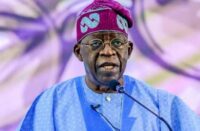 The Central Bank of Nigeria on Tuesday expressed worries over large inflow of “hot money†or short-term investments into the economy, saying that the development, if not monitored, could negatively affect some of the positive impact of its monetary policy.
The Central Bank of Nigeria on Tuesday expressed worries over large inflow of “hot money†or short-term investments into the economy, saying that the development, if not monitored, could negatively affect some of the positive impact of its monetary policy.
Addressing journalists at the bank’s headquarters in Abuja shortly after the Monetary Policy Committee meeting, the Governor, CBN, Mr. Lamido Sanusi, said the “hot money†was coming into the economy as a result of further monetary easing in the United States and Europe, as well as improved yield on fixed income instruments.
An online investment dictionary, Investopedia.com, defines hot money as funds that flow regularly between financial markets as investors attempt to ensure they get the highest short-term interest rates possible.
According to it, the funds usually flow from low interest rate yielding countries into higher interest rate countries by investors looking to make the highest return.
It added that the financial transfers could affect the exchange rate if the funds were withdrawn suddenly.
Sanusi said about $1.5bn of such funds came into the economy in August alone, adding that the bank would continue to monitor such funds in order to reduce their negative impact on the economy.
He said, “The committee identified the key policy challenges to include protecting the domestic economy and building external reserves buffer; potential large inflow of ‘hot money’ resulting from further monetary easing in the US and Europe; and improved yield on fixed income instruments; as well as persisting high core inflation rates.
“We planned to keep monetary conditions very stable and tight, which means that we do not see much of very quick reversal of capital flows unless there is a major disaster in Europe and the US, and most important is to keep a tab on how much money comes in, and I think in August, we had about $1.5bn, which is twice what has been coming in July on the average.â€ÂÂ
The governor also said the committee retained the Monetary Policy Rate at 12 per cent with a corridor of +/-200 basis points.
Also retained at the current levels were the Cash Reserve Requirement and the Net Open Position for Deposit Money Banks at 12.0 per cent and one per cent respectively.
These were the highpoints of the decisions taken by members of the MPC at the meeting. The MPR is the anchor rate at which the bank, in discharging its mandate as the lender of last resort, lends to Deposit Money Banks.
Sanusi said the decisions were unanimously taken by the 10 members present at the meeting.
In arriving at the decision, he said the committee identified various key policy challenges to monetary policy.
These include how to protect the domestic economy and build up external reserves buffer as well as persisting high core inflation rates.
He also said the committee considered developments in the global and domestic economy and the financial markets, noting that weak global growth indices called for cautious optimism by policymakers.
Sanusi said the committee further noted that its decisions at the July meeting appeared to have had some positive impacts on a number of areas.
The areas are the deceleration in year-on-year inflation in August, stability of short-term interest rates around the MPR, build-up in external reserves and stability in the exchange rate.
He, however, lamented that core inflation was still high at 14.7 per cent in August, adding that the threat of increased inflow of hot money arising from the actions of the US to further stimulate the economy through its capital reversal implications would be closely monitored.
The CBN governor said, “The committee noted the rise in oil prices but cautioned against a hasty deployment of the windfall to immediate consumption as the trend could be reversed. Monetary policy could not, therefore, under the circumstance, react to what may be purely temporary developments.â€ÂÂ
Source: Punch/Ifeanyi Onuba






